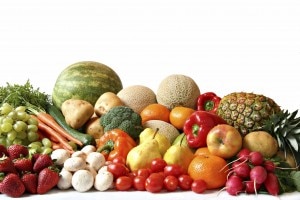Facebook fan Christine L. asked us to write about the alkaline diet and provide a list of foods that affect the body’s acid/alkaline balance. Do you have a topic you’d like us to feature in the VitaBlog? Share with us here or on Facebook.
You may have seen or heard the term “alkaline diet” in health magazines or on TV talk shows. But what exactly does it mean?
For many years, we have known that what we eat can affect our body both positively and negatively. Our eating habits have evolved over time as manufacturing and agriculture advancements made it easier to mass-produce grain, meat and dairy products (acid-producing foods).
At the basis of the alkaline diet is the theory that consuming a diet of acid-producing foods causes an imbalance which can negatively impact the body in many ways. The alkaline diet focuses on restoring and maintaining a balanced pH level (a measurement of acidity/alkalinity) within the body through certain foods that contain either acidic or alkaline properties.
The optimal alkaline diet consists of 80% alkaline and 20% acid-forming foods. In theory, this balance may support normal energy levels, healthy weight management and more.
Now that we know a little more about the alkaline diet, here are some helpful lists of foods to consider:
Alkaline-forming foods (the alkaline diet promotes the consumption of these foods)
- Grains: quinoa, oatmeal
- Oils: coconut, avocado, flax, olive
- Fruits/veggies: Lemons, melons, dried figs, apples, dates, papaya
- Nuts/seeds/herbs: pumpkin seeds, chestnuts, lentils, cinnamon, parsley, garlic, ginger
- Beverages: mineral water, herbal tea, fruit juices (grapefruit, apple, pineapple)
- Other: sea salt, black pepper, apple cider vinegar
Acid-forming foods (the alkaline diet suggests decreasing consumption of these foods)
- Meats/fish/poultry: Beef, bacon, shrimp, lobster, salmon, tuna, chicken
- Dairy: ice cream, cream cheese, cottage cheese, yogurt, butter
- Grains: white flour products, rye bread, whole wheat bread, cornmeal, white rice
- Fruits/veggies: cranberries, pomegranates, corn
- Nuts/seeds: soybeans, walnuts, hazelnuts, peanuts
- Oils: soybean, peanut, cottonseed
- Beverages: milk, coffee, wine, beer, soda
- Other: white sugar, iodized salt
While it may be tempting to follow the latest diet trend, remember that you should consult with a doctor or naturopath before radically modifying your eating habits, especially if you have an existing health condition.

